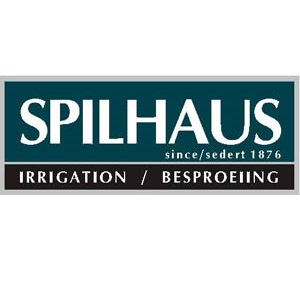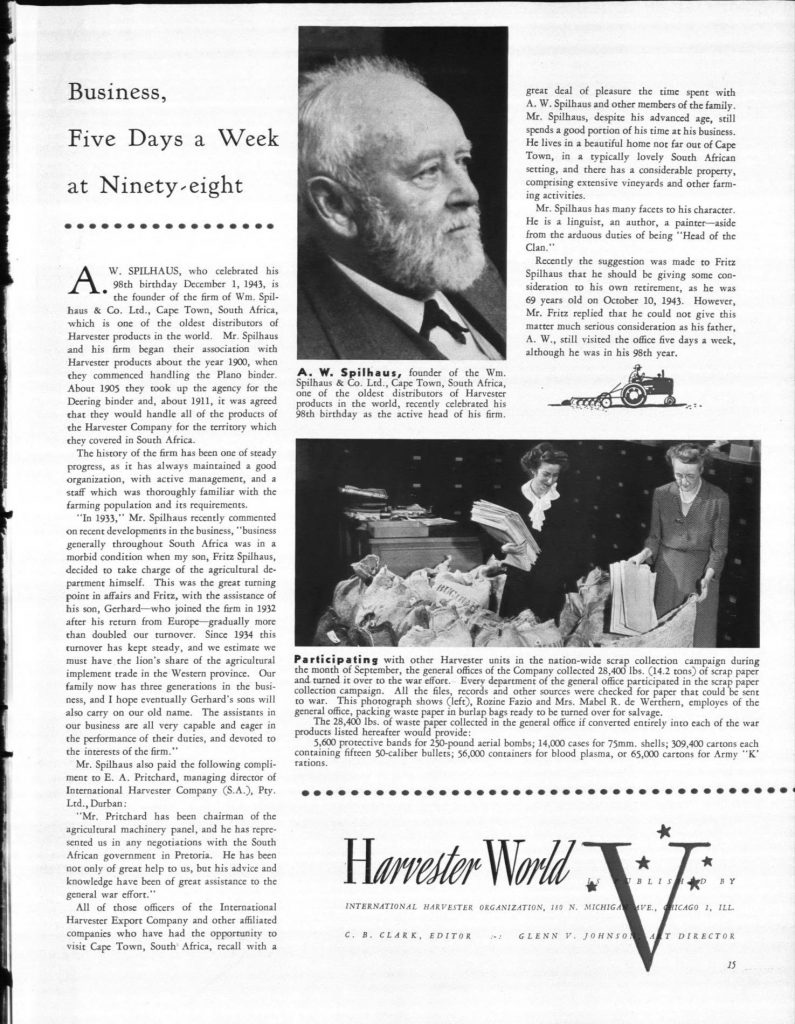SPILHAUS IS BESPROEIING

Spilhaus – Die verlede tot hede
Toe Arnold Wilhelm Spilhaus sy eie verskepings- en landbouprodukte-uitvoerbesigheid gestig het in Oktober 1876, het hy geen benul gehad watter hoogtes sy maatskappy sou behaal nie.
Dit sou dalk sy grootste verwagtinge oortref het as hy geweet het dat sy eers klein maatskappy, geleë in ‘n klein gebou in St. Georgestraat, Kaapstad, sou groei en uitbrei om takke te hê. Maar dan weer die feit dat Mnr. A W Spilhaus ‘n baie ambisieuse man was.
Spilhaus bestaan nou al 136 jaar, en aanvaar dat sukses vir hom inherent is. Maar om die hede te waardeer, moet jy eers die verlede van nader bekyk.
Met die Kaapstadse firma W. A. Lippert & Kie. het Mnr. A. W. Spilhaus sy eerste opwagting in die kommersiële praktyk gemaak. Sy ontmoeting met Mnr. Herbert Wilman, vennoot van die firma P. J. Alport & Kie. in Beaufort-Wes, het tot die stigting gelei van die firma Wilman, Spilhaus & Kie., Algemene Handelaars, produkte- en kommissieagente. Hul gebou was in St. Georgestraat, Kaapstad.
Maar met die sukses van die besigheid, het Wilman, Spilhaus & Kie. teen ‘n geweldige tempo uitgebrei. So ‘n tempo, dat dit genoodsaak was om na vier jaar groter geboue aan te skaf, nl. op die hoek van St. George- en Kasteelstraat. Nadat Mnr. Wilman afgetree het en Mnr. A. W. Spilhaus die firma geheel oorgeneem het, het die besigheid verskuif na Strandstraat 58.
Uitvoerhandel was deur die firma hanteer, en die vernaamste skeepsproduk was wol. Alhoewel ander produkte soos boegoe, velle, lusern en graan ook gehanteer was, het die welbekende volstruisveer-oplewing soveel vereis dat ‘n hele verdieping van die gebou in Strandstraat afgestaan moes word alleenlik vir die sorteer en afsending van vere.
Dit het later al hoe duideliker geword dat Suid Afrika se landboubedryf, soos ander lande, meer gemeganiseer geword het. Dus het Wm. Spilhaus & Co., Ltd. landbougereedskap, masjinerie en besproeiingstoerusting ingevoer, gedistrubeer en herstel. Masjinerie vir die maak van paaie is ook ingevoer, en die besigheid het bekendheid verwerf vir ingenieursbedrywighede.
In die meentyd is verteenwoordigers na Brittanje en V.S.A. gestuur sodat die besigheid altyd op hoogte kon bly met die nuutste landbougereedskap en ontwikkelings in ingenieurswese.
Met die tyd het Spilhaus verdeel in ‘n landbou-ingenieursbedryf en as handelaars in silwerware en glas. Met betrekking tot die landbouafdeling, het Spilhaus sy oog verskuif na watervoorsiening en besproeiing, wat tot in die hede sy middelpunt van aandag is.
Mnr. A. W. Spilhaus se beginsel was om persoonlik in elke personeellid belang te stel. Uitgesluit hierdie goeie verhouding, was daar ook ‘n warm gevoel tussen die firma, hul algemene handelaars en die kliënte. Spilhaus het ook seker gemaak dat, tot vandag, die beginsels van hoflikheid, billike bedinging, besorgdheid oor ander en integriteit diep ingesetel is.
Vandaar die besigheid se sukses.
Spilhaus bestaan sedert 1876, ‘n volle 136 jaar. ‘n Tyd waarin hy drie oorloë en heelwat ekonomiese insinke getrotseer het. As Mnr. A. W. Spilhaus kon terugkyk na sy besigheid in die hede , sou hy voorwaarlik trots wees.
Spilhaus het deur die jare verwissel van eienaar, en so het die maatskappy op ‘n tydstip behoort aan ‘n groot versekerings-maatskappy wat vandag nog bestaan.
In 1980 het Spilhuas weer van eienaar verwissel en is oorgeneem deur WPK as hulle besproeiings-arm in die landbou. Gedurende hierdie tyd het Spilhaus nuwe takke oopgemaak in plekke soos Pretoria (groothandel), Robertson, Upington, Kakamas, Vredendal en Kimberley. Spilhaus het toe reeds gevestigde takke gehad in Bellville, Ceres, De Doorns, Malmesbury, Montagu, Swellendam en Wolseley.
In 2002 het WPK besluit om nie meer aan te gaan met Spilhaus nie, en na onderhandelings is die takke aangebied om gekoop te word deur onderskeie personeel. Weens verskeie redes is sekere takke nie oorgeneem nie.
Die besighede wat toe vootgegaan het was naamlik:
Wm Spilhaus Boland in Stikland, Bellville
Wm Spilhaus Ceres in Ceres
Wm Spilhaus Hexvallei in die Hexvallei (De Doorns)
Wm Spilhaus Vredendal in Vredendal
Wm Spilhaus Malmesbury in Malmesbury
Wm Spilhaus Wolseley in Wolseley
Na ongeveer ‘n maand wat bogenoemde plekke aan die gang was het die eienaars ‘n vergadering gehou en besluit dat ons die nie die naam en die kultuur van Spilhaus tot niet moet laat gaan nie. Daar is besluit om die Spilhaus-Groep tot stand te bring vir samewerkings-ooreenkomste tussen mekaar en met voorsieners.
Op hierdie tydstip het ons ‘n oud kollega genader om ook tot die groep toe te tree naamlik Delta Besproeiing op Swellendam.
As Groep kan daar beding word vir beter pryse met voorsieners wat tot voordeel van die klient sal wees. Die Groep wou ook hê dat daar met die reeds goeie verhoudings met die voorsieners voortgebou word, en dat daar ‘n wen-wen situasie kan wees vir beide partye, en dus ook tot die voordeel vir die kliente van die Groep.
Die Groep het ‘n elektroniese prysboek op rekenaar wat op ‘n daaglikse basis op datum gehou. Hierdie elektroniese prysboek is een van die redes vir die sukses van die Groep.
Die handelsmerk “Spilhaus” is teruggekoop en sal weer soos in die verlede orals trots vertoon word.
Met verloop van tyd het Spilhaus verder uitgebrei met nog besighede wat aangesluit het onder die naam, naamlik Wm Spilhaus Montagu, Wm Spilhaus PE, Wm Spilhaus Cradock en nou ook Wm Spilhaus Bloemfontein.
Die groep huidiglik is dus:
Wm Spilhaus Bloemfontein
Wm Spilhaus Boland
Wm Spilhaus Ceres
Wm Spilhaus Cradock
Wm Spilhaus Hexvallei
Wm Spilhaus Kimberley
Wm Spilhaus Malmesbury
Wm Spilhaus Montagu
Wm Spilhaus Oudtshoorn
Wm Spilhaus Piketberg
Wm Spilhaus Port Elizabeth
Wm Spilhaus Swelendam
Wm Spilhaus Vredendal
Wm Spilhaus Wolseley
Hede tot toekoms.
Die Groep wil sien dat hulle van sterkte tot sterkte gaan, en sodoende voortbou op ‘n sukses-resep. Die groep wil graag waarde toevoeg vir die klient en dus sodoende ook tot landbou.
Huidiglik staan die aantal lede in die groep op elf.
WM Spilhaus During WWII

A.W. SPILHAUS, who celebrated his 98th birthday December 1, 1943, is the founder of the firm of Wm. Spil- haus & Co. Ltd., Cape Town, South Africa, which is one of the oldest distributors of Harvester products in the world. Mr. Spilhaus and his firm began their association with Harvester products about the year 1900, when they commenced handling the Piano binder. About 1905 they took up the agency for the Deering binder and, about 1911, it was agreed that they would handle all of the products of the Harvester Company for the territory which they covered in South Africa. The history of the firm has been one of steady progress, as it has always maintained a good organization, with active management, and a staff which was thoroughly familiar with the farming population and its requirements. “In 1933,” Mr. Spilhaus recently commented on recent developments in the business, “business generally throughout South Africa was in a morbid condition when my son, Fritz Spilhaus, decided to take charge of the agricultural de¬ partment himself. This was the great turning point in affairs and Fritz, with the assistance of his sohttps://content.wisconsinhistory.org/digital/collection/ihc/id/16220n, Gerhard—who joined the firm in 1932 after his return from Europe—gradually more than doubled our turnover. Since 1934 this turnover has kept steady, and we estimate we must have the lion’s share of the agricultural implement trade in the Western province. Our family now has three generations in the busi¬ ness, and I hope eventually Gerhard’s sons will also carry on our old name. The assistants in our business are all very capable and eager in the performance of their duties, and devoted to the interests of the firm.” Mr. Spilhaus also paid the following compli¬ ment to E. A. Pritchard, managing director of International Harvester Company (S.A.), Pty. Ltd., Durban: “Mr. Pritchard has been chairman of the agricultural machinery panel, and he has repre¬ sented us in any negotiations with the South African government in Pretoria. He has been not only of great help to us, but his advice and knowledge have been of great assistance to the general war effort.” All of those officers of the International Harvester Export Company and other affiliated companies who have had the opportunity to visit Cape Town, South Africa, recall with a great deal of pleasure the time spent with A. W. Spilhaus and other members of the family. Mr. Spilhaus, despite his advanced age, still spends a good portion of his time at his business. He lives in a beautiful home not far out of Cape Town, in a typically lovely South African setting, and there has a considerable property, comprising extensive vineyards and other farm¬ ing activities. Mr. Spilhaus has many facets to his character. He is a linguist, an author, a painter—aside from the arduous duties of being “Head of the Clan.” Recently the suggestion was made to Fritz Spilhaus that he should be giving some con¬ sideration to his own retirement, as he was 69 years old on October 10, 1943. However, Mr. Fritz replied that he could not give this matter much serious consideration as his father, A. W., still visited the office five days a week, although he was in his 98th year.<br> A. W. Spilhaus, founder of the Wm. Spilhaus & Co. Ltd., Cape Town, South Africa, one of the oldest distributors of Harvester products in the world, recently celebrated his 98th birthday as the active head of his firm.<br> Participating with other Harvester units in the nation-wide scrap collection campaign during the month of September, the general offices of the Company collected 28,400 lbs. (14.2 tons) of scrap paper and tiuTied it over to the war effort. Every department of the general office participated in the scrap paper collection campaign. All the files, records and other sources were checked for paper that could be sent to war. This photograph shows (left), Rozine Fazio and Mrs. Mabel R. de Werthern, employes of the general office, packing waste paper in burlap bags ready to be turned over for salvage. The 28,400 lbs. of waste paper collected in the general office if converted entirely into each of the war products listed hereafter would provide: 5,600 protective bands for 250-pound aerial bombs; 14,000 cases for 75mm. shells; 309,400 cartons each containing fifteen 50-caliber bullets; 56,000 containers for blood plasma, or 65,000 cartons for Army “K’ rations.<br> INTERNATIONAL HARVESTER ORGANIZATION, ISO N. MICHIGA^^VE., (gllCAGO 1, ILL. C. B. CLARK, EDITOR GLENN V. J 0 HNSO ^^AgT DIRECTOR
A.W. Spilhaus & His Life with Botany
Click here for A.W. Spilhaus’ S2A3 Biographical Database

